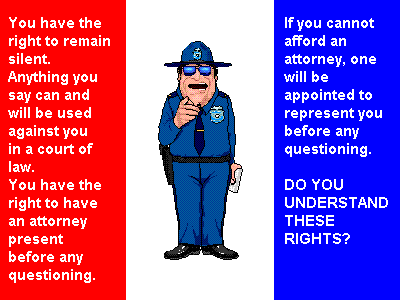

More than 30 years have passed since the decision of the United States Supreme Court in Miranda v. Arizona (1966), 384 U.S. 436, and the so-called "Miranda Warnings" have become so familiar that many children can repeat them simply from watching police characters on televsion. Experienced officers know the litany by heart and can easily recite it to arrested suspects without using reference cards. The average citizen seems to believe that an officer's failure to give those warnings is equivalent to Monopoly's "Get Out Of Jail Free" card. But when are such warnings really necessary?
Miranda Warnings are required only in situations involving custodial interrogation. Custodial interrogation is defined as "questioning initiated by law enforcement officers after a person has been taken into custody or otherwise deprived of his freedom of action in any significant way."1 No warnings are necessary unless the suspect is in custody, nor are any warnings needed until a law enforcement officer initiates questioning.
An example of a situation where Miranda Warnings were unnecessary may be illustrated by a case that was presented to us a few years ago. A police officer was called to the home of a suspect accused of committing a crime against another family member. During discussions with other family members, the suspect approached the officer and began expressing shame about what he had done. The officer stopped the conversation, demanding that the suspect not speak until he could be taken back to the station and "read his rights." He refused to let the suspect continue talking, despite the fact that the suspect was not in custody and had not been asked any questions! By the time the suspect was transported to the police station and advised of his constitutional rights, he no longer wished to discuss the matter. A good confession may have been lost simply because the officer misunderstood the requirements of Miranda.
There is no "bright line" rule for determining whether an individual is in custody; that fact must be determined from all the circumstances. One Ohio court has held:
Although a determination of whether a suspect is "in custody" for purposes of receiving Miranda protection depends on the circumstances of each case, the ultimate inquiry is simply whether there is a "'formal arrest or restraint on movement' of the degree associated with a formal arrest." In making this determination, "the only relevant inquiry is how a reasonable man in the suspect's position would have understood his situation."2
When deciding whether a suspect is "in custody," it does not matter whether a particularly timid suspect feels "threatened" by the officer's authority, or whether the officer has a secret intention to arrest the suspect if he or she confesses. The United States Supreme Court has stated that the proper focus is "on the objective circumstances of the interrogation, not on the subjective views harbored by either the interrogating officers or the person being questioned."3 The question to be decided is: Would a reasonable person believe that he or she was free to leave?
Of course, if an officer intends to question a suspect without reciting Miranda Warnings, it is a good idea to remind the suspect that he or she may leave at any time. If the officer has transported the suspect to a place that is distant from where they initially met, the officer should also offer to take the suspect back. However, unless the officer gives the suspect a reason to believe that he or she is not free to leave, no Miranda Warnings are necessary.
Even if a suspect is in custody, Miranda Warnings are not always necessary for police officers to receive confessions. "The Fifth Amendment does not bar volunteered statements."4 If suspects wish to "confess their sins" without being questioned, nothing prevents officers from passively listening to what they have to say. The Ohio Supreme Court has said that when a suspect "initiated the discussion with police and volunteered the information," and when the officer asked no questions, the suspect "was not subject to custodial interrogation and was not entitled to Miranda warnings."5
This does not mean that an officer can "bait" a suspect into making a statement without actually asking any questions. Comments or actions which are obviously intended to provoke a response from the suspect will be considered the same as questioning. The United States Supreme Court has defined interrogation as "not only ... express questioning, but also ... any words or actions on the part of the police (other than those normally attendant to arrest and custody) that the police should know are reasonably likely to elicit an incriminating response."6 However, if officers do nothing to provoke a statement, and if suspects wish to "bare their souls," there is no harm in listening, and there is no need for Miranda Warnings.
1 Miranda v. Arizona (1966), 384 U.S. 436, 444.
2 State v. Warrell (1987), 41 Ohio App. 3d 286, 287, citing
California v . Beheler (1983), 463 U.S. 1121, 1125, and Berkemer
v . McCarty (1984), 468 U.S. 420.
3 Stansbury v. California (1994), 511 U.S. 318, 323.
4 State v. Waddy (1992), 63 Ohio St. 3d 424, 440, citing Miranda
v. Arizona, supra at 478.
5 State v. McGuire (1997), 80 Ohio St. 3d 390, 401.
6 Rhode Island v. Innis (1980), 446 U.S. 291, 301